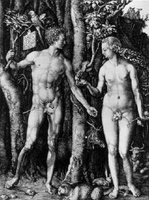Scripture and Sexual Orientation
 One of the substantive arguments used by those who desire full inclusion of homosexuals into the life of the church, is that the Bible knows nothing of sexual orientation, and therefore, its condemnations do not fall upon those who are "naturally" gay. In other words, Paul's declaration of judgment upon homosexual activity in Romans 1 is really against those who act contrary to their nature, and not against a person whose "orientation" (or nature) is homosexual.
One of the substantive arguments used by those who desire full inclusion of homosexuals into the life of the church, is that the Bible knows nothing of sexual orientation, and therefore, its condemnations do not fall upon those who are "naturally" gay. In other words, Paul's declaration of judgment upon homosexual activity in Romans 1 is really against those who act contrary to their nature, and not against a person whose "orientation" (or nature) is homosexual.I first heard this interpretation as a seminary student in the late 1980s, and rejected it out of hand as being an obvious case of isogetical special pleading. As our denomination has pledged itself to dialogue, I gave this argument another look, and read more nuanced and sophisticated versions of what I had learned from my New Testament professor back in seminary. Nonetheless, my convictions remain what they were in 1989, in fact they have become stronger in the face of a more aggressive agenda in our midst.
There are two problems with asserting that the Bible knows nothing of sexual orientation (or sexual identity). The first is theological, and the second is exegetical.
1. As Robert W. Jenson has noted in Vol. 2 of his Systematic Theology (p.91ff.), if the Bible knows nothing of sexual identity or orientation, then it can say nothing to us about sexuality at all, and further, it can say nothing to us about anything. Paul writes in 2 Timothy 3:16, "All Scripture is given by inspiration of God, and is profitable for doctrine, for reproof, for correction, for instruction in righteousness, that the man of God may be complete thoroughly equipped for every good work." That is, Scripture is sufficient, and is not lacking in the equipping of the saints. If the Bible knows nothing about orientation, then it is not God's Word, it is not theopneustos, and we are left with what Jenson describes as chaos in the church. Thankfully, the Bible does know about sexual identity, and it is spoken of positively in Genesis 2 and Matthew 19:4-6, as the attraction between a man and a woman. All other attractions are not orientations, but sinful deviations from man's nature resulting from the fall. Thus, there is no such thing as "homosexuality," only homosex or homo-eroticism (as Gagnon, Jenson and others have pointed out). There is according to the Holy Spirit, sexuality, and then there are sinful sexual practices which violate our nature as created by God.
2. Exegetically, pro-gay advocates impose upon the New Testament text, a peculiar definition of "orientation," one which contradicts the Bible's understanding of human nature and sexuality. In Romans 1:26, Paul uses the word phusin, which is typically translated "nature." It refers to that fixed state of being created and ordained by God. In this passage, Paul is clearly asserting that because of unbelief, God "gave them over" to homosexual behavior which is contrary to nature. There must be one God-ordained human nature, otherwise God would have no just standard against which to judge and condemn sexual sins.
"Orientation" is a very recent concept, with no scientific or sociologically accepted content. The word "orientation" is used by those arguing for full inclusion because it sounds scientific. This word is used as a substitute for "nature" (phusin), and puts forward the idea that human sexual nature is not static, but fluid. There is, however, no scientific data available establishing that a homosexual orientation even exists. Therefore, to say that Bible knows nothing of this modern understanding of sexuality is to ask the Bible to give its approbation to something unproven, and quite likely fallacious. One cannot dismiss the Bible because it has nothing to say about something which does not exist. This is an exegetical form of "bait and switch," and while clever, in the ends violates the doctrines of the perspicuity and authority of Scripture. If we follow the inclusionist exegesis, we will have a Bible which is at best an archaic wisdom-source to be used warily, and at worst, a disposable source of oppression. Jenson's warning about chaos is pertinent here. Apart from the Word, rightly interpreted, everyone will do what is right in their own eyes. Such a state is called anarchy.



1 Comments:
Well articulated.
R.V. Young, in Touchstone magazine, has an article on how "homosexuality" is a historical and linguistic innovation: http://touchstonemag.com/archives/article.php?id=18-10-036-f
Post a Comment
<< Home